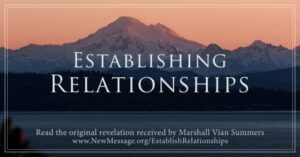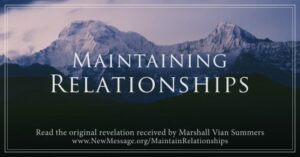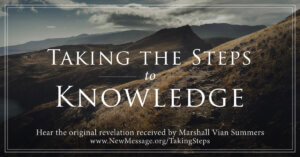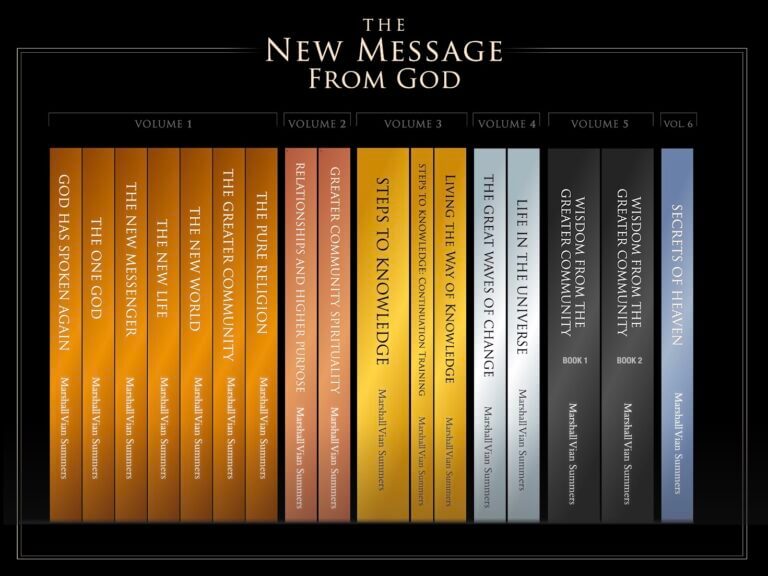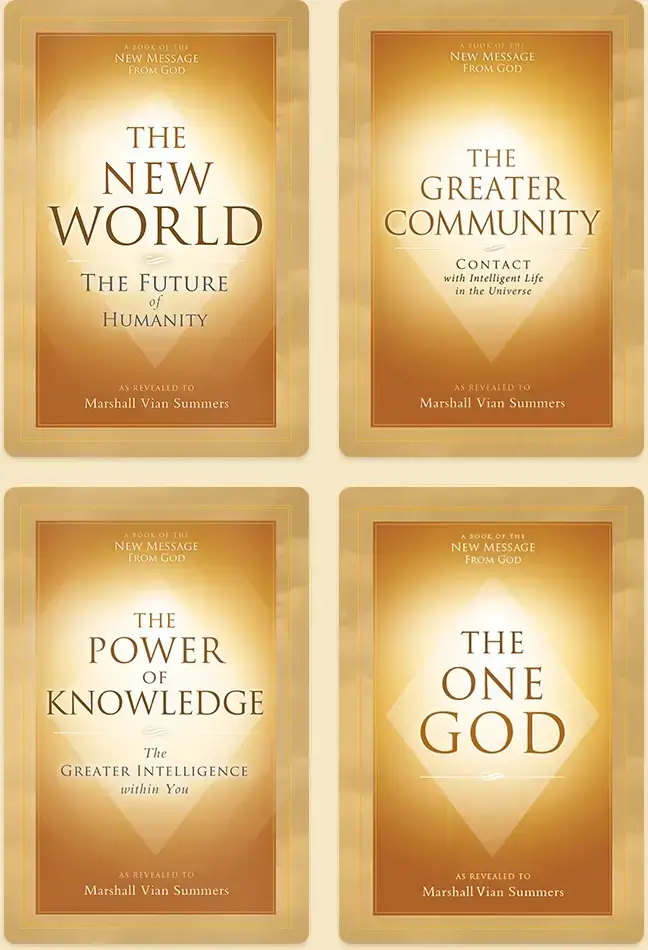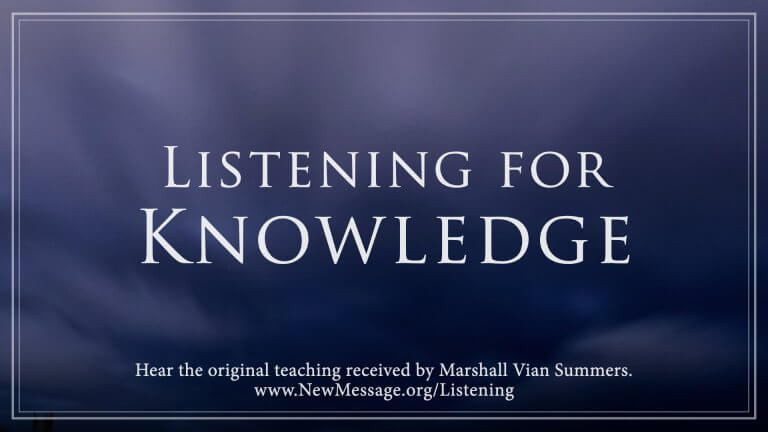
Marshall Vian Summers
on September 24, 2009
in Boulder, Colorado
Hear the original spoken revelation:
Download (Right-click to download)
Part of your development in The Way of Knowledge is to learn how to watch—to watch without coming to conclusions, to watch without trying to decide what is real or not, to watch without trying to connect what you are seeing with what you know already, but just watching.
You watch the world and you listen, like the birds in the air and the animals in the field. You watch and you pay attention to your changing environment. This attentiveness is necessary. Without it, you will miss the signs of the world, and you will miss what Knowledge is telling you inside of yourself, which requires that you learn how to be in a receptive state.
Receiving the power and the presence of Knowledge requires a still and watchful state of mind. Through the course of your day, you have so many opportunities to practice this—time that you spend waiting for something; time that you spend when you first wake in the morning, when you can listen more deeply within yourself before you get up and become busy with the day; time spent in intervals between activities; time which is wasted by fantasy and fearful imagination, by pointless speculation, or by simply allowing your mind to wander wherever it may go in its chaotic state.
The mind must be employed or allowed to rest, and its employment is not always in a state of work. It may be focused on an enjoyable activity, but it must be focused. When it is not focused, it should be allowed to rest so that you may use it to listen and to look.
It is always important to establish a list of questions for Knowledge, fundamental questions that do not require explanation as much as they reflect a fundamental decision—whether you should do this or not, whether you should read this or not, whether you should take this action or not, whether you should be with this person or not, whether you should choose another way in life or in your work or not.
The answer to these questions will not be immediate. You must learn to live with them, abide with them and keep them open. If you can do this and develop the discipline to do this rather than giving yourself self-comforting answers or just giving up after so little effort has been spent, then you will develop the depth, the intention and the capacity to respond to the guidance of Knowledge.
Listening for Knowledge then becomes a very important activity, an activity that you practice in meditation and also with your eyes open out in the world. When you speak to another, listen to them and also listen inside at the same time, to make sure you are communicating what you really want to communicate and are not just being accommodating or foolish.
Listening for Knowledge becomes something that you do increasingly as you develop this practice—this practice in inner listening, this practice of listening to others truly, waiting for Knowledge to indicate what is really taking place in your engagement and what they are truly communicating to you at that time.
The tragedy here is that people are not listening. Caught up in their activities, in their desires, in their fears, in their conflicts and their frustrations, they are not paying attention to anything but their own thoughts. They are living in a kind of personal Hell that seems to be perpetual, and they are constantly reinforcing this focus and this obsession within themselves. This obsession becomes reinforced in their conversations with others, while others talk about their self-obsessions and you talk about your self-obsessions, and nothing real is being communicated.
How do you stop this then—this which seems so habitual and so commonplace, this which occupies so much of your time and energy and robs you of your insight and clarity, strength and power? You practice by replacing it with something else.
Instead of a constant internal chattering away, you begin to practice listening. It is difficult at the outset because you are so used to allowing your mind to run wild like a wild and crazy animal, or like a disloyal and misbehaving child. It runs wild here and there and everywhere. So it seems hard to stop and just listen because it is not a habit for you yet. It is going against your habits and your conditioning, but as you practice, it is also breaking your habits and your conditioning.
The practical benefit of this is immense because most human disasters and mistakes are made or created because people are not paying attention. When you are driving an automobile, take your mind off the road for one second and you can hit someone—a pedestrian, or another vehicle—with tragic and unfortunate consequences.
You must be careful in everything you say in the world and practice discernment and discretion. Listening inside while you speak will enable you to do this. But if you are just chattering away unconsciously, unaware of what you are really saying and unaware of its impact upon others, then you are acting destructively. You are betraying yourself. You are undermining your well-being.
This practice in listening, and listening for Knowledge, is so fundamental to your development and to your success in life. It will make it more difficult for you to make a mistake. It will make it more difficult for you to have an error in your judgment.
You will feel restraint when you are about to make a wrong decision or say something that should not be said. You will begin to read the signs of your own mind and body, which are telling you that something is amiss or that you are about to make a very hazardous and unfortunate decision. [Not doing this] is robbing you of the experience of confirmation within yourself when you are about to make a valuable decision. These things are so fundamental to the possibility of success in life that they cannot be underscored or underestimated.
Stop watching the television. Stop listening to music all the time. Start to pay attention to your own experience. Get used to being in silence. Begin to value silence and you will seek it out. You will need it for reprieve and refreshment. Instead of constant stimulation and constant conversation, you become more watchful, more careful, more discerning. This is what it means to become conscious, aware in the moment, paying attention.
Here it is so much more easy for Knowledge to speak to you, to guide you, to restrain you or to move you forward when that is necessary. You have created an opening in your mind where Knowledge can exert its influence and provide its grace and guidance for you. Here you have the power and develop the strength to set aside your preferences and to arrest your fears so that you may listen and respond.
The only way you will know if you are making the right decision is by having the experience that you know. The only way you can be sure if you are making a mistake is to have the experience of all the doubt and restraint and anxiety that goes along with making a wrong decision. In other words, it is being really aware and attentive to your experience. And here you gain the ability to discern what is real from what is not, what feels correct and what does not. You do this not at the level of your wishes or your fears, but at a deeper level that is much wiser and much more powerful in these matters.
This will take time because you are undoing years and years of habit, years and years of preoccupation, years and years of self-obsession or the obsession over other things or people. You are counteracting your social conditioning, which is powerful and overwhelming until you break free of it. So this will take time and daily application.
When you practice Steps to Knowledge, and you practice stillness in the steps of Steps to Knowledge, you are practicing inner listening really. You are not listening to get a reward or to make an immediate contact—you are listening to develop the ability to listen. You are creating an opening in your mind, deep in your mind, between your surface thinking mind and the deeper well of Knowledge within yourself. You are creating an opening, a channel, a doorway, an aperture.
Because Knowledge is not chattering away all the time like your personal mind, you will find that you will listen and there will be nothing. But that is what you want. You want to listen and experience stillness and experience openness and emptiness to open your mind. Knowledge is not some little answering machine that just gives you answers any time you want them. If that is your experience, then you are not yet engaged with Knowledge. You begin to value the stillness, the quiet, the peace, the reprieve that this experience will give to you.
At first, perhaps you can only practice for minutes at a time, but you build upon this. You practice saying “Rahn” or “Na Rahn,” and you keep focused on these sounds, which you do not understand. And you begin to pass through all of these different kinds of obsessions, persuasions and distractions because you are staying with that. You are allowing your mind to settle down, to become quiet, to rest, so that the deeper mind within you can become part of your experience.
You listen for Knowledge while you are waiting for the bus. You listen for Knowledge while someone is talking to you. You listen for Knowledge as you are gazing out the window. You listen for Knowledge as you are walking down the street. You listen for Knowledge as you clean your house. You listen for Knowledge as you are riding in a car. You listen for Knowledge as you are sitting in an airplane.
The opportunities for practice are almost endless. They represent all the wasted time and wasted opportunities of your life that are mindlessly thrown away by constant stimulation, or by fantasy, or obsession, or endless worry, or preoccupation.
Then when the moment comes when Knowledge has something really important to give to you, you will be able to respond, and your response will be strong enough that it will stay with you. And you will recognize it and value it as something important, even if you do not fully understand it in the moment. You will stay with it to see what it reveals over time.
Sometimes it will require immediate action—to stop something you are about to do, to step away from something in the moment, to disengage from a group of people, to take evasive action or to say something or do something that will change the nature of your conversation with others. But usually Knowledge will give you a clear and important sign, and you will have to be with this. If you are practicing listening for Knowledge, you will have the strength, and you will understand the importance of being with this.
Sometimes an insight like this may require considerable contemplation. If you are to make an important change in your living circumstances or in your primary relationships, it may take considerable time, and you may struggle or have difficulty with this. But if it is true, it will not change. It will not go away. And you cannot manipulate it to meet your preferences.
Sometimes great insights require long contemplation and many steps of action, such as changing your life fundamentally often requires these things. Here you are paying as much attention to the inside of yourself as you are paying to the outside. But instead of being preoccupied over every little thought, every little emotion, every little dream, every little image, you are listening for Knowledge—the deeper current of your life.
People who are obsessed over their thoughts and their feelings and their dreams will never recognize the deeper current of their life because they are not looking in the right place. They are still self-obsessed at the surface of their mind and have not learned to listen more deeply and to develop the patience, the skill and the perseverance to do this.
Studying your personality will not tell you who you are, or why you are here, or whom you must meet, or what you must do and not do. Self-obsession and self-awareness are moving in opposite directions, attending to very different aspects of yourself. If you are a slave to your mind, and to your thoughts, and to your feelings, and to the expectations of others, then you have really not begun the real journey that is before you.
The practice that We are giving here is foundational. It requires more willingness and intention than actual skill. But there will be skill in determining a real sign from some passing phantom in your mind. This will depend on the depth of your inner inquiry and how deeply you listen within yourself over time.
You are getting impulses all the time—you might be compulsive about certain things, you might be obsessive over certain people or situations, and that is likely the case. How do you tell the difference between these and a real sign or message from Knowledge?
The answer is what you are listening to and listening for within yourself. If you listen carefully and practice this on a daily basis, you begin to see all the little impulses and compulsions—they just go by like the clouds. They are like leaves blowing in the wind. But there is something much greater and much more real. As you keep listening, they will pass. Perhaps you will feel them intensely for a moment, or for an hour, but they will pass because they are without real substance.
You are listening for something deeper, something more solid, something more real, something more permanent. This will teach you how to recognize the difference between a compulsion, or some kind of impulse, or some kind of persuasion in the mental environment, and the real power and presence of Knowledge.
People are impatient. People do not pay attention. People want answers, not experience. People do not want to have to work very hard. They want to just drift along in their obsessive, compulsive state. But that cannot be the truth for you if you are to have any hope of discovering your greater purpose and your greater strength.
The world is now facing the Great Waves of change, and there is Intervention in the world from races from beyond who are here to deceive humanity and take advantage of your weaknesses, your conflicts and so forth. You are not living in casual times. You cannot be fooling around in the face of the Great Waves of change, for they have the power to destroy your life and everything that you value.
You must get serious about your life and your presence here in the world at this time. You must honor your presence here and recognize that you have a fundamental responsibility in being here, and you are accountable to those who sent you here.
But only Knowledge within you can account for these things, for they are not related to your upbringing. They are not related to your social conditioning or the persuasions of others. They are fundamental within you, no matter what you think or do. And it is these greater things that are fundamental that you really need to get connected with because they hold the key and the promise of your life.
It is Knowledge that will bring the great relationships to you. It is not your prancing around, making a fool of yourself and degrading yourself in every conceivable way to try to attract the attention and the approval of some person.
This is a different journey. It is not a journey of instant gratification. It is not a journey of compulsion. It is not a journey where you get everything you want like a little spoiled child. It is a more powerful endeavor and one that yields results that nothing else can provide.
Sit quietly and listen. Listen more deeply. If your mind gets caught up and takes you away, you bring it back. You practice “Rahn” or “Na Rahn,” and you bring it back. You come back. Of course, you will be distracted. You have lived your whole life being distracted. That is not all going to go away in a moment. Your mind is not used to being directed. It is used to being chaotic, and now you are beginning to direct it in a purposeful and meaningful way.
Listen for Knowledge, and you will know it is true. You will practice this, and Knowledge will give you simple things to do and not to do. It is preparing you for the greater decisions that are yet to come, which you are not yet ready to make, not with certainty or courage.
You start out with little things, and you maintain a list of questions that are simple and direct, requiring a positive or a negative response because that is how Knowledge will respond to you at the beginning. It is either a yes or a no. Put every question in this form, and you will begin to experience the response within yourself.
Knowledge is not like your intellect. It is not comparing and contrasting, always in a state of confusion and debate. It is absolutely certain in where it is taking you and where you must go.
Yet it will not respond to questions that have no bearing on this, so you must ask questions that are more important and not play games here, for if you do, Knowledge will be silent. If you ask a question and put it into a form that requires a positive or negative response, then be very sure that you really want this question answered. If you are not sure about this, do not ask. Do not play games here. Do not fool around.
Knowledge will hold you back from many things. You are not used to holding yourself back, and that is why your life has been a series of dilemmas and even catastrophes. It is going to save you for something greater.
But first, you must stop committing the same mistakes, making the same foolish assumptions, the same mindless decisions. You must slow down. You must stop. You must take time to practice listening—listening for Knowledge, listening to develop the listening ability and the intention and the capacity within yourself.
People sit for five minutes. They do not get great insight, and they think it does not work, but they are not practicing anything. And the answers that they receive they usually give to themselves anyway, and so it is all an exercise in foolishness.
You do this because you need to know where you are going in life, and you need to find the greater powers that can guide you and bring to you those people and those opportunities that are essential for your success and fulfillment.
These are things you cannot provide for yourself and you cannot figure out with your intellect. But the power and presence of Knowledge resides beyond the boundaries and the reach of the intellect. That is what makes it powerful. That is what makes it pure and uncorruptible. And that is the great strength that you must now find within yourself and that you must promote in others.
Let this be your understanding.

